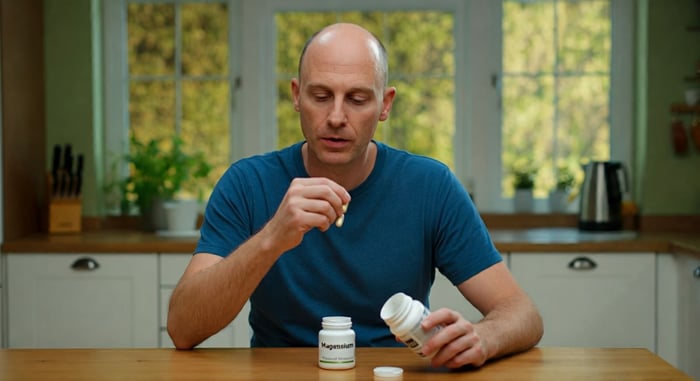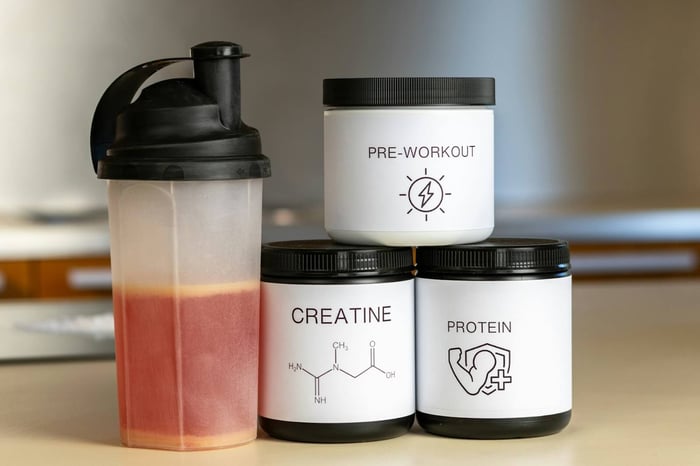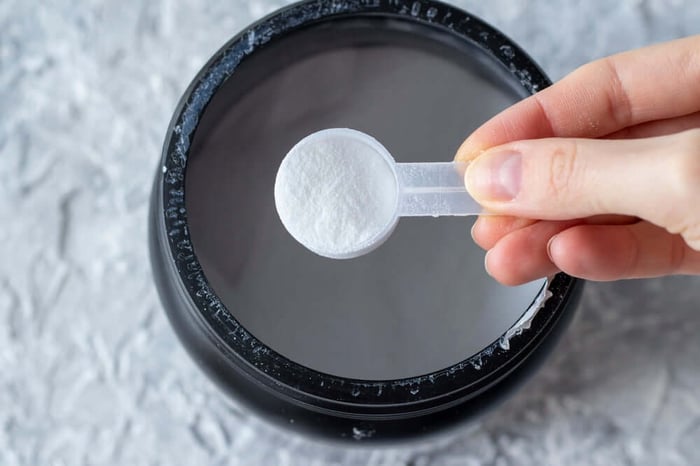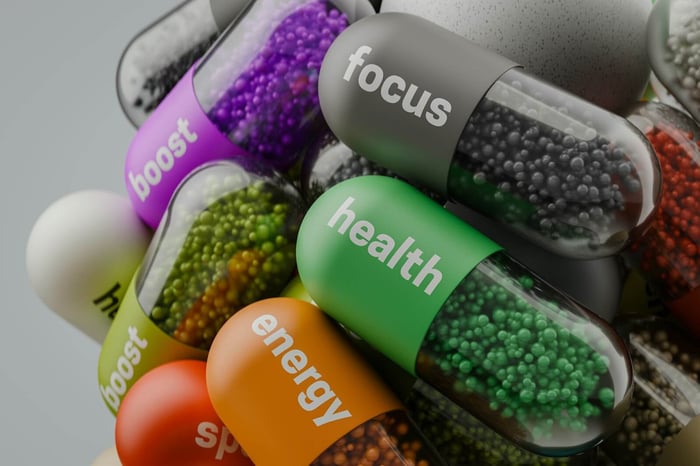
There's a raging debate at the moment when it comes to supplements. Some people swear by them, while others demand acceptance that they do nothing.
Backed by the fact we've seen endless trends, brands, and products come and go over the last decades (nootropics, anyone?), the whole thing can feel like a mess.
Here's the deal. The real deal.
Science states that, yes, supplements can help and bring about a positive effect in your life. They're perhaps not powerful enough to guarantee longevity or drastically reduce the risk of disease, but when coupled with a healthy lifestyle, they can bring benefits.
Think of it this way: even if exercise had zero direct physical benefits (which it doesn't), the simple act of establishing a healthy daily routine encourages a mindset of self-care. This can lead to better choices throughout the day and an overall healthier lifestyle.
And if you want to go this deep, placebos have been proven to be just as powerful as taking actual medication due to the psychological effect of believing you're doing something good.
So there's all that, plus the fact it's actually beneficial to your health, meaning taking supplements can be a great way to add another layer of healthy living to your life.
But only if you're taking the right supplements.
I get it: walking into a supplement store these days feels like stepping into a scientific lab where everything promises to turn you into Superman. Shelves full of the good, the bad, and the ridiculously overhyped.
I'm not here to sell you magic pills. Instead, I'll cut through the BS and share what actually works, backed by solid science. Whether you're hitting the gym hard, fighting the mid-afternoon energy crash, or just trying to stay healthy as you age, I've got you covered.
In this guide, you'll discover:
Which supplements are worth your hard-earned money
The real science behind men's supplementation needs
How to avoid getting ripped off by marketing hype
Exactly when and how to take each supplement for maximum benefit
Let's get into it.
Why Men Need Supplements

I used to think a decent diet was enough.
"Just eat your veggies, and you'll be fine," right? Well, after diving deep into the research and working with hundreds of men, I've learned it's not that simple anymore.
A recent study in the Journal of Nutrition found that over 90% of men aren't getting enough key nutrients from their diet alone. And no, it's not just because we're all eating pizza and burgers (though, let's be honest, who doesn't love a good burger?).
Although there's absolute greatness in eating a proper diet. The study found the US population surveyed has the following deficiencies:
45% inadequacy of vitamin A
95% inadequacy of vitamin D
84% inadequacy of vitamin E
15% inadequacy of zinc
What's more, even if you're crushing your meal prep game, modern farming practices have led to a 40% decline in the nutrient density of our fruits and vegetables compared to just 50 years ago. And this was a study from 2004 so imagine it now.
Yeah, that hit me hard, too, when I first learned about it. Even if you're eating your five a day and cut sugar down to the bare minimum, meal prep weekly, and think you're doing well, the chances are that modern farming practices keep you under what you actually need.
And on top of this, here's why supplements have become more crucial than ever for us guys:
Stress of modern life
First off, our bodies are dealing with more stress than ever before.
Whether you're grinding at work, hitting the gym, or trying to be Super Dad, your body needs extra support. The American Psychological Association reports that men's stress levels have a massive increase over the last decade alone, which they're calling a crisis.
That stress? It's literally draining your body of essential nutrients like magnesium and B vitamins.
Testosterone
After 30, our T-levels naturally drop by about 1% each year. While the best supplements for men can't completely stop this decline, research shows that specific nutrients can help maintain healthy levels and keep you feeling like yourself.
Environmental factors
Another silent killer. The EPA estimates we're exposed to over 80,000 different chemicals in our daily lives – from air pollution to plastic compounds. Your body needs extra nutritional ammunition to deal with this toxic load.
Exercise factors
If you're hitting the gym (and you should be), your nutritional needs skyrocket. The International Society of Sports Nutrition confirms that active men need up to 50% more of certain nutrients compared to sedentary guys.
Those best workout supplements for men aren't just for bodybuilders anymore – they're for any man wanting to stay active and strong.
Gut Connections
Modern processed foods, antibiotics, and stress have waged war on our gut bacteria. A healthy gut microbiome isn't just about better digestion – it's linked to everything from stronger immunity to better mental health.
Sometimes, the best supplements for men over 40 are the ones that support this crucial system.
The bottom line?
While nothing replaces a solid diet, strategic supplementation isn't just about filling nutritional gaps anymore. It's about optimizing your body to handle the demands of modern life and maintaining peak performance as you age.
And our diets, no matter how good they are, need our help.
How We Selected These Supplements
Before we get into the supplements, let's explore how they're picked and why you should be interested in them. I'll be quick so we can get to the good stuff.
First, we're not talking about specific supplements. Truth is, especially in the US, these aren't super regulated and aren't tested for safety or quality.
As outlined on the Huberman podcast, the supplement industry is a bit of a Wild West, unregulated (specifically in the US), and the dosages listed on the packaging can be anywhere from 40% to 600% inaccurate (both above and below).
Instead, I'm outlining the supplement types that have been proven to work best, and then it'll be up to you, depending on what you want and where you are in the world, to research, see what's available, fit your budget, and choose a brand that works for you.
There's plenty of information online on Google reviews, Trustpilot, Facebook, and so on to help make this easy.
Personally, I'm big into personal testing, so many I'll have tried myself (I'm currently about to start a process of working with AG1 to see what their multi-blend is about, although, for the price and the hype marketing, I'm probably not going to stay on it for long), but that doesn't really help you, because you're not me.
I'll add my personal opinion where I can, but remember your body and biology is unique, so your experience can and will be different.
As always, make sure you speak to your healthcare provider or doctor first before making any big changes to your diet or well-being so you can make the decisions that are right for you.
10 Best Supplements for Men
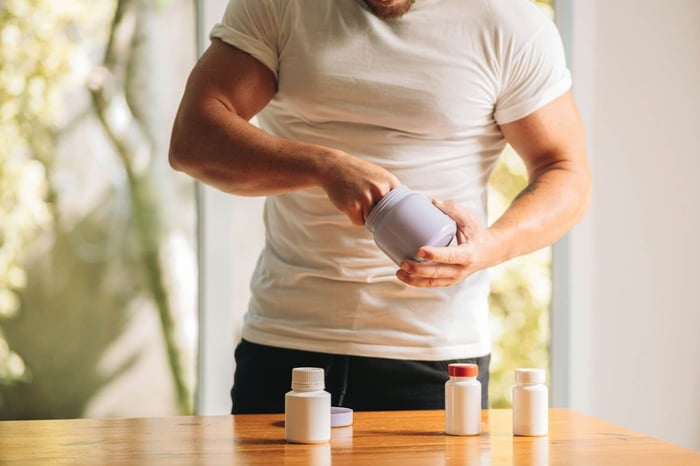
So, here we go. The best supplements you need to know when it comes to the supplements that actually deserve your attention and money.
#1 - Multivitamins: Your Nutritional Insurance Policy
Look, I know multivitamins aren't sexy. But they're like having insurance for your nutrition – you hope you don't need it, but you're glad it's there.
Here's what to look for in a quality multivitamin:
Methylated B vitamins (especially B12 and folate)
At least 1,000 IU of Vitamin D3
Chelated minerals for better absorption
No mega-doses (more isn't always better)
Pro tip: Skip the gummies. They're usually underdosed and packed with sugar. Go for a high-quality capsule or tablet instead.
#2 - Vitamin D3: The Hormone Optimizer
As above,
Here's a shocking stat: about 42% of American men are deficient in Vitamin D. And no, chugging milk isn't enough to fix it.
Why you need it:
Boosts testosterone production naturally
Strengthens bones and muscles
Supports immune function
Improves mood and energy
The sweet spot is 2,000-5,000 IU daily, taken with a fatty meal for best absorption. And yes, you need it even if you live in a sunny place – unless you regularly sunbathe at noon with most of your skin exposed.
#3 - Magnesium
If there's one mineral most guys are missing, it's magnesium. Modern farming and stress literally drain this stuff from our bodies.
The benefits are massive:
Better sleep quality
Reduced muscle cramps
Improved energy production
Enhanced stress management
Aim for magnesium glycinate or threonate – better absorbed than the cheap oxide form. Take 300-400 mg daily, split into two doses if possible.
#4 - Omega-3 Fish Oil
"But I eat fish!" Yeah, probably not enough. Most guys need supplemental omega-3s. One source states that almost all adults in the Western world are.
The research is crystal clear on this one:
28% reduction in heart disease risk
Significant improvements in brain function
Reduced joint inflammation
Better recovery from exercise
Quality matters enormously here. Look for brands that list the specific amounts of EPA and DHA, and aim for a combined total of 1,500-2,000mg daily.
#5 - Zinc
Zinc is like a bodyguard for your testosterone levels. Plus, it's crucial for your immune system.
The research shows:
Helps maintain healthy T levels
Boosts immune function
Supports prostate health
Enhances wound healing
Take 15-30 mg daily with food. If you're hitting the gym hard or under stress, lean toward the higher end.

#6 - Protein Supplements
Here's the thing about protein powder – it's not just for bodybuilders anymore. Think of it as a practical solution for our crazy-busy lives.
Why it matters:
Preserves muscle mass as you age
Supports recovery from any physical activity
Keeps you feeling full longer
Helps maintain healthy blood sugar
What most guys get wrong: Focusing only on protein content. Look for supplements with minimal artificial sweeteners and good digestibility scores. I prefer whey isolate or a plant-based blend if you're dairy-sensitive.
Daily target: 0.8-1g of protein per pound of body weight total, using supplements to fill gaps when needed.
Source - Alt: A protein shaker with a stack of three tubs of white label supplement
#7 - Creatine Monohydrate
Let me bust a myth right now: creatine isn't just for meatheads. It's one of the most researched supplements ever, benefiting everyone, from athletes to executives.
The science is solid:
Enhanced cognitive performance
Better recovery between workouts
Improved cellular energy production
Take 5g daily, any time. No loading phase is needed. And yes, it's safe long-term – we've got decades of research backing this up.
#8 - Vitamin B Complex
Feeling drained by 3 PM? Your B vitamins might be running low. These are crucial for turning food into energy.
Key benefits:
Sustainable energy levels
Better stress management
Enhanced cognitive function
Improved mood stability
Look for a B complex with methylated forms (especially B12 as methylcobalamin and folate as 5-MTHF). Your body will thank you.
#9 - CoQ10: The Anti-Aging Essential
After 40, your body's CoQ10 production drops like a rock. And if you're on statins, you need this even more.
What it does:
Powers your cellular energy production
Supports heart health
Reduces exercise-related fatigue
Protects against oxidative stress
Take 100-200 mg daily with a fatty meal. Choose the ubiquinol form if you're over 40 – it's better absorbed.
#10 - Probiotics
Let's talk about your gut. It's connected to everything from your immune system to your mental health.
The research shows probiotics can:
Strengthen immune function
Improve nutrient absorption
Reduce inflammation
Support mental clarity
Look for strains like Lactobacillus and Bifidobacterium, with at least 20 billion CFUs. Take them before bed on an empty stomach.
A crucial note: Not all these supplements work overnight. Give them time:
Vitamin D: 2-3 months
Creatine: 2-4 weeks
Probiotics: 4-8 weeks
Others: Variable, but consistency is key
How to Choose Quality Supplements
As I mentioned before, the supplement industry is a bit like the Wild West. There are no hard-and-fast guarantees that what you're getting works, has the right dosages in it, nor what the actual ingredients are, so you need to be selective.
The supplements industry is worth over $189 billion, and many supplements get advertised on podcasts and platforms headed by the likes of Andrew Huberman and Joe Rogan.
Not saying that's bad, but that's a ton of money in advertising with huge payoffs, something we should all be wary of.
Instead, here's a way to maximize your chances of getting it right.
Third-Party Testing
Ever heard of USP, NSF, or Informed Choice? These are your new best friends.
These independent organizations test supplements to verify:
What's on the label is actually in the bottle
No harmful contaminants
Accurate dosage information
Pro tip: Look for their logos on the bottle. If a company isn't willing to get its products tested, you've got to wonder why.
Manufacturing Standards Matter
Here's a scary stat: The FDA found that about 70% of supplement companies weren't following basic manufacturing practices.
What to look for:
GMP (Good Manufacturing Practice) certification (if you’re in the UK)
FDA-registered facilities
Clear quality control processes
Transparent sourcing of ingredients
Read the Label Like a Detective
Don't fall for fancy marketing. Here's what to watch for:
Red flags to avoid:
Proprietary blends (usually just a way to hide cheap ingredients)
Mega-doses are way above the recommended levels
Artificial colors and unnecessary fillers
Vague terms like "premium quality" without backing
The Price vs. Quality Sweet Spot
Here's the truth – the most expensive supplement isn't always the best, but the cheapest is rarely good.
Think about it this way:
Too cheap? Corners were probably cut
Too expensive? You might be paying for marketing
Right? Usually in the middle range with solid third-party testing
Storage and Expiration Dates
This matters more than you'd think. Even the best supplements for men become worthless if they're not stored properly.
Quick guidelines:
Keep them cool and dry
Away from direct sunlight
Check expiration dates regularly
Don't buy more than you can use in 3-6 months
Remember, quality supplements aren't cheap, but they're a lot less expensive than poor health. Invest wisely in your health now, and your future self will thank you.
Timing and Dosage Guidelines

Let me help you get the timing right. Because sometimes, it's not just what you take – it's when and how you take it.
The Morning Stack
Start your day strong. Here's what works best with your morning coffee:
Multivitamin (with breakfast)
Vitamin D3 (with your fattiest meal)
B Complex (for sustained energy)
CoQ10 (with breakfast)
Pro tip: Never take your morning supplements on an empty stomach unless specifically directed. Trust me, I learned this one the hard way.
The Workout Window
If you're hitting the gym, timing matters:
Pre-workout:
Creatine (anytime, but consistency is key)
B vitamins (if not taken in the morning)
Post-workout:
Protein supplement (within 30 minutes)
Magnesium (helps with recovery)
Evening Essentials
Some supplements work better when you take them at night:
Magnesium (helps with sleep)
Probiotics (on an empty stomach)
Fish oil (helps absorption)
Zinc (better absorbed away from iron)
Smart Stacking Rules
Here's what most supplement companies won't tell you:
Don't mix:
Iron and calcium supplements
Zinc and copper supplements
Fat-soluble vitamins without some dietary fat
Do combine:
Vitamin D with K2 for better absorption
Magnesium with Vitamin D
B-complex vitamins together
Cycling Supplements
Not everything needs to be taken year-round:
Vitamin D (test levels seasonally)
Creatine (can cycle off every 12 weeks)
Probiotics (cycle different strains)
Remember: These are guidelines, not rigid rules. Listen to your body and adjust accordingly. And always check with your doctor if you're on any medications.
Final thoughts
Look, I've thrown a lot of information your way. But here's what I really want you to take away from all this.
Supplementation isn't about turning you into Superman overnight. It's about optimizing what you're already doing and filling in the gaps where modern life leaves us short.
However, the bottom line is this.
The best supplements for men aren't magic pills – they're tools in your health arsenal. Use them wisely alongside:
A solid diet focused on whole foods
Regular exercise
Good sleep habits
Stress management
Start small. Don't feel like you need to buy everything at once. Here's how I recommend approaching this:
Begin with the foundational supplements:
A quality multivitamin
Vitamin D3
Omega-3s
Add others based on your specific needs:
Active lifestyle? Add creatine and magnesium
High stress? Consider B-complex and adaptogens
Over 40? Look into CoQ10
Track your results. Keep notes on how you feel, your energy levels, and any changes you notice.
And as a final word of wisdom:
Remember what I said at the start – supplement companies are fighting for your dollars. Stay informed, be skeptical, and always prioritize quality over quantity.
Before making any major changes to your supplement routine, have a chat with your healthcare provider, especially if you're on medication. It's not just about being safe – it's about being smart.
